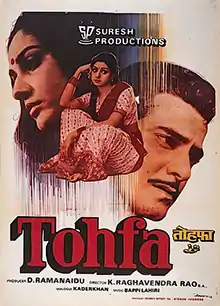Tohfa
Tohfa (transl. Gift) is a 1984 Indian Hindi-language masala film produced by D. Ramanaidu under the Suresh Productions banner and directed by K. Raghavendra Rao. It stars Sridevi, Jeetendra, and Jaya Prada.[1] The film is a remake of the Telugu film Devata (1982). The film upon its release was a massive box office success, grossing ₹9 crore , becoming the highest-grossing Indian film of 1984.[2]
| Tohfa | |
|---|---|
 Theatrical release poster | |
| Directed by | K. Raghavendra Rao |
| Produced by | D. Rama Naidu |
| Written by |
|
| Screenplay by | K. Raghavendra Rao |
| Based on | Devata (1982 film) by K. Raghavendra Rao |
| Starring | Sridevi Jeetendra<br]] Jaya Prada |
| Music by | Bappi Lahiri |
| Cinematography | K. S. Prakash |
| Edited by | K. A. Marthand |
Production company | |
Release date |
|
Running time | 160 minutes |
| Country | India |
| Language | Hindi |
| Box office | ₹9 crore (equivalent to ₹113 crore or US$16 million in 2019) |
The film's narrative follows siblings Janki and Lalita who both fall for Ram, their good friend. When Lalita learns that Janki loves Ram, she steps back and allows her sister to marry him. It was a direct remake of Raghavendra Rao's Telugu blockbuster Devatha (1982), with Sridevi and Jaya Prada reprising their roles.
At the 32nd Filmfare Awards, Tohfa received three nominations: Best Comic Actor (Kapoor), Best Music and Best Lyrics "Pyaar Ka Tohfa Tera."[3]
Plot
Janaki (Jayaprada) and Lalita (Sridevi) are sisters who love each other dearly. Lalita and Ram (Jeetendra) fall passionately in love with each other. Unknown to them, Janaki is also in love with Ram. When Lalita finds out, she decides to sacrifice her relationship with Ram. In haste, she marries a good-for-nothing man (Shakti Kapoor), who is arrested by the police immediately afterward. Unaware of Lalita's true motive, Ram and Janaki are furious with her.
Lalita moves away and is not seen for several years. Ram and Janaki get married and live happily; their only sorrow is their inability to have children. Many years later, Ram meets Lalita again. She is working in an office and singlehandedly bringing up her son. To his shock, Ram realizes that he is the father of Lalita's son. The child had been conceived in a moment of passion between Ram and Lalita before they separated. Ram is torn between his loyalty to his wife Janaki and the pull of affection towards his son. Janaki, now expecting a child, finds out about her sister's reappearance but misunderstands the whole situation. She begins to suspect Ram and Lalita of cheating on her. However, at last, all the misunderstandings are cleared up. The true extent of Lalita's sacrifice becomes known to Janaki, who feel very guilty. Janaki gives birth to a daughter and passes away, leaving the baby and Ram in Lalita's care.
Cast
- Jeetendra as Ram
- Sridevi as Lalita
- Jaya Prada as Janki
- Kader Khan as Raghuveer Singh
- Shakti Kapoor as Kaamesh Singh
- Asrani as Poojari
- Aruna Irani
- Jagdeep
- Leela Mishra as Dadi
- Mohan Choti as Jamoore
Soundtrack
All songs are composed by Bappi Lahiri and lyrics are penned by Indeevar.
| Song | Singer |
|---|---|
| "Albela Mausam Kehta Hai Swagatam" | Lata Mangeshkar, Kishore Kumar |
| "Gori Tere Ang Ang Mein Roop Rang Ke" | Asha Bhosle, Kishore Kumar |
| "Ek Aankh Maarun To Parda Hat Jaaye" | Asha Bhosle, Kishore Kumar |
| "Pyar Ka Tohfa Tera Banaaye Jeevan Mera" | Asha Bhosle, Kishore Kumar |
| "Milan Maujon Se Maujon Ka" | Asha Bhosle, S. P. Balasubrahmanyam |
Marketing and reception
Producer D. Rama Naidu employed huge billboards and cut outs for film's publicity before its release and managed to create considerable public interest. Upon its release, Tohfa was immediately noticed for its item number "Pyar Ka Tohfa Tera" picturised on Jaya Prada and the risque "Ek Ankh Marun To", picturised on Sridevi sung by Asha Bhonsle, both of which became chartbusters.[1]
Legacy
The dialogue "Aaoo Lalita" used by Shakti Kapoor became popular and Kapoor named his restaurant after the dialogue in 2017.[4]
References
- "Pulse of the people". The Hindu. 16 September 2010. Retrieved 16 June 2012.
- "Worth their weight in gold (80s)". Box office India. Archived from the original on 11 January 2016. Retrieved 2 January 2016.
- List of Filmfare Award Winners and Nominations, 1953–2005
- Arunachalam, Param (14 April 2020). BollySwar: 1981 - 1990. Mavrix Infotech Private Limited. ISBN 978-81-938482-2-7.